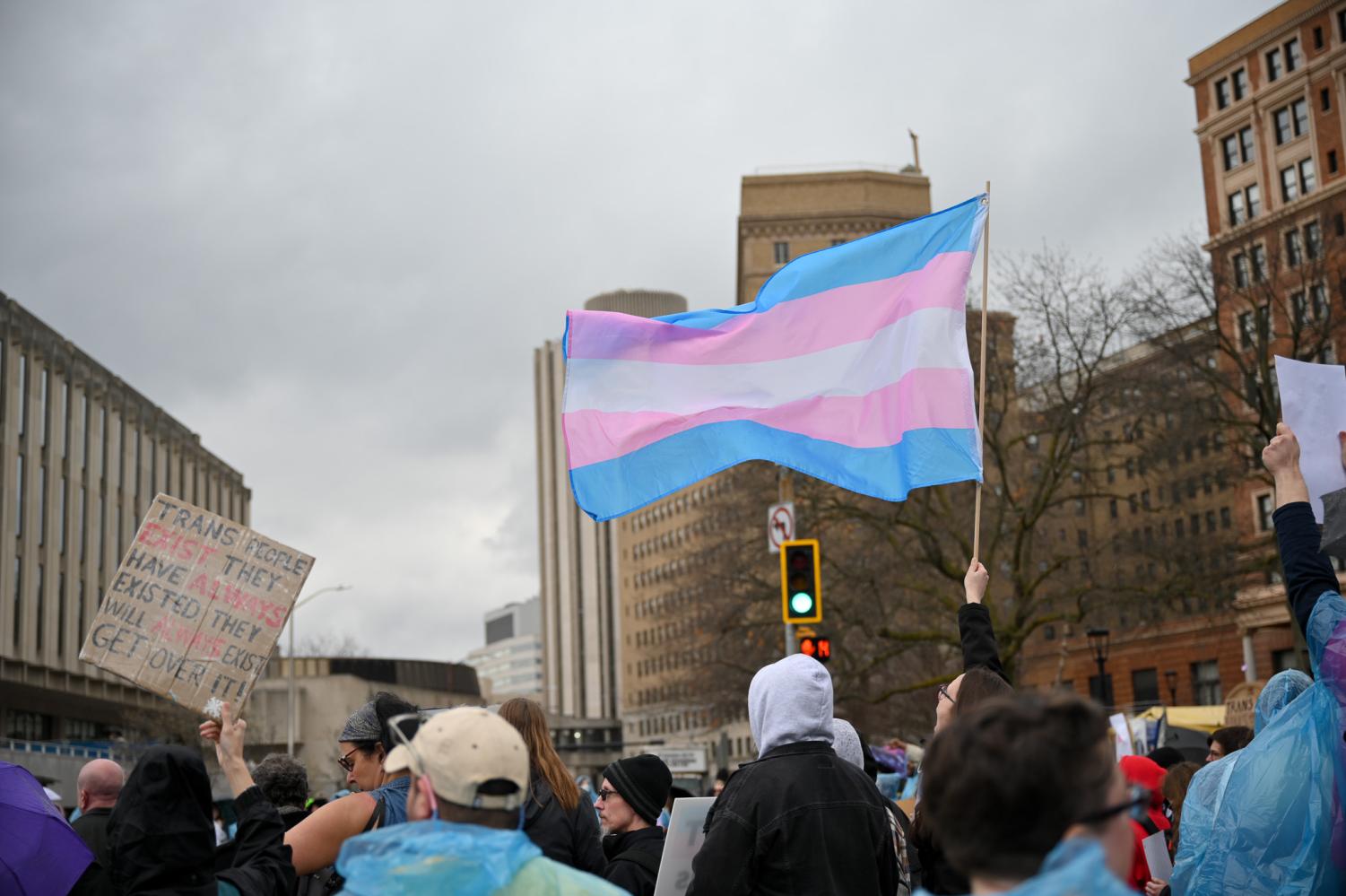Pittsburgh designated as a gender-affirming care sanctuary city among nationwide pushback


A protester holds up a transgender pride flag at a rally protesting Riley Gaines’ appearance at the O’Hara Ballroom on March 27, 2023.
City Council passed a bill that declared Pittsburgh a sanctuary city for gender-affirming care on September 12. The bill, which received a 8-0 vote, amended a 2011 ordinance that designated Pittsburgh as a “Human Rights City.” The bill will protect healthcare providers, as well as recipients of care and their legal guardians, from out-of-state investigation or prosecution.
The bill defines gender affirming care as “the range of social, psychological, behavioral, and medical interventions designed to support and affirm an individual’s gender identity when it conflicts with the gender they were assigned at birth.”
The bill was sponsored by democratic councilmembers Barbara Warwick, Bobby Wilson and Bruce A. Kraus. Warwick discussed how the introduction of the bill comes during a nationwide fight over transgender rights.
“These bills come in response to a spate of restrictions on gender affirming care across the nation,” Warwick said. “Bans on gender-affirming care have been passed in 20 states, and are being considered in seven more.”
The passed legislation consists of two ordinances that protect recipients of gender-affirming care on multiple levels. Warwick said the first ordinance, No. 1842, “protects those involved in gender-affirming healthcare, including care service providers, recipients and legal guardians, from out-of-state investigation or prosecution for providing said care.”
“City of Pittsburgh officials, officers, employees, or departments will not provide any information or expend any resources, including time, money, facilities, property, equipment, [or] personnel to investigations seeking to impose civil or criminal liability or professional sanction upon those involved,” Warwick said.
The second ordinance, No. 1843, will decriminalize gender-affirming care services in Pittsburgh in the event of a nationwide ban.
“The second ordinance stipulates that, should gender affirming services become illegal nationwide or in the Commonwealth of Pennsylvania, Pittsburgh law enforcement is instructed to deprioritize enforcement of crimes relating to their access,” Warwick said.
Warwick said the introduction of the bill solidifies Pittsburgh’s promise to serve and protect communities in need.
“By opposing these attacks on the rights of the trans community, this legislation affirms the city’s commitment to being a safe and welcoming city to the LGBTQ+ community, and fortifies Pittsburgh’s status as a Human Rights City with material action,” Warwick said.
Devin Brown, a sophomore nursing major, said they are excited to hear of the new bill protecting transgender rights.
“I was very happy [to hear] that Pittsburgh was becoming a sanctuary city for gender affirming care, especially with so many states trying to get rid of it in the last few years,” Brown said. “It gives me more reassurance that there are still officials who care about trans lives and rights.”
The introduction of the bill in Pittsburgh sets a positive example for other cities, according to Dena Stanley, founder and executive director of TransYouniting, a mutual-aid non-profit that provides crisis housing and food assistance to Pittsburgh’s transgender community.
“It’s a step in the right direction to save lives,” Stanley said. “It’s also a way to show the rest of the country what cultural humility looks like.”
Brown said while they are grateful that transgender individuals have the option to seek care in Pittsburgh, they still think the fact that people need to travel for gender-affirming care is unfair.
“It is still not right that they have to travel out of state in the first place,” Brown said. “It will at least give them an option if they are financially able to and have transportation to make the trip.”
Stanley said she expects the passing of the bill to cause an increase in transgender individuals without housing or employment seeking resources from TransYounited.
“Outside of just [City Council] putting this ordinance in place, there is no infrastructure to truly keep trans folks safe,” Stanley said. “If you go into a healthcare facility, they are not fully equipped to deal with trans folks’ full system needs. In order to get healthcare in Pittsburgh, you must have an address, [and] if you don’t, you can’t get full access to necessary health care.”
Recent Posts
SGB introduces new governing code bill and addresses rumors of ICE on campus
At its weekly meeting at Nordy’s Place on Tuesday, Student Government Board introduced an omnibus…
Opinion | School should be in the summer
Although this may be controversial, I believe that from this data, it is evident that…
Weathering the storm: Pittsburgh teams have tackled some of the toughest environments
The end of the year in western Pennsylvania is always marked by two things —…
Notes From an Average Girl // Notes on Book Banning
In this edition of Notes From an Average Girl, senior staff writer Madeline Milchman writes…
To Be Honest // Yup, it is that damn phone
In this edition of To Be Honest, staff writer Evin Verbrugge writes about her phone…
Meaning at the Movies | Portraying Toxic ‘Adolescence’
In this edition of Meaning at the Movies, staff writer Lauren Deaton explores the mini-series…

